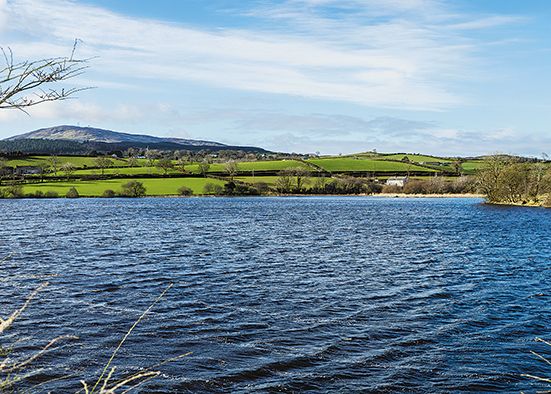‘Better management’ of fresh water lakes may prevent floods
‘Better management’ of fresh water lakes may prevent floods
21 February 2024

ALMOST four months after Downpatrick town centre flooded when the Quoile river burst its banks, a former local councillor believes that better management of a large fresh water lake at Spa, near Ballynahinch, could help prevent a future catastrophe.
William Brown is a former Down Council chairman and represented both the Ballynahinch and Newcastle areas.
He believes that controlling the water level at McAuley’s Lake would not only ease pressure on the Downpatrick river during extreme wet weather, but provide a significant environmental gain for the waterway, encouraging a major resurgence in wildlife.
Last November, town centre businesses and a heritage railway were swamped by flood water which was recorded as almost six feet deep in places causing in the region of £20m in damage.
Mr Brown said water from McAuley’s Lake makes its way to the Quoile via Drumaness and into Strangford Lough.
Mr Brown said a sluice gate — designed to control water levels at the lake — has not been opened for years.
“The gate has never been opened for a very long and the lake is sitting full to the brim all the time. I do not believe that is doing anyone any good,” he said.
“I believe that if the sluice gate was opened to reduce the water level it would mean there would be capacity for it it hold more during extremely wet weather which would reduce the water flowing into the Quoile and its level would not rise exponentially.”
Mr Brown said if the water was retained in the lake it could subsequently be held there before being released to flow towards the river when its level had receded.
He explained because the water in McAuley’s Lake is high, when there is heavy rain, the water just pours out of it.
“I believe the level of the lake could be ped about nine feet which would make a significant difference,” Mr Brown contended.
“The lake is over 100 acres and controlling the water level would not be a total cure to prevent future flooding in Downpatrick it would most certainly help in my opinion.”
The businessman said the sluice gate at McAuley’s Lake was opened and closed in the past and said in the 1930s his father opened it every morning at 5.30am to power a scutch mill.
“The water would eventually find its way to Drumaness and on to the Quoile river.”
In the aftermath of the Downpatrick flood, government officials said the devastating incident happened after one of the wettest Octobers on record.
Mr Brown believes if the water level at McAuley’s Lake had been lowered before this, the volume of water that ended up overflowing and making its way to the Quoile could have been considerably less.
And a the debate continues on what exactly happened last November and how future flooding can be prevented, the former councillor believes better management of the water level at the Spa lake is worth investigating.
“It would not cost a lot of money to open a sluice gate now and again,” he continued.
“This could be done in a matter of minutes and perhaps there is merit in fitting a more modern gate to make it easier to open and close.”
Mr Brown said reducing the water level would require the erection of stock fencing at the far side of the lake.
“When I walked past the lake going to school in the 1930s, the lake was teaming with wildlife. There was mallard, widgeon and other ducks and 25 swans. Today there are just three swans because there are no feeding grounds.
“If you lower the lake, the feeding grounds will return around the edge of it and the birds will come back. So reducing the water level will have an additional benefit. Wild geese used to come to the lake and perhaps they may also return.”
Mr Brown said much better feeding ground has the potential to encourage them to stay.
“Reducing the water level would be a cost effective measure worth considering to help ease pressure on the Quoile during extreme wet weather which we see more and more of,” he added.
“ I don’t see any benefit allowing the lake’s water level to remain high all the time. But lowering it could help ease the pressure on the Quoile.”


